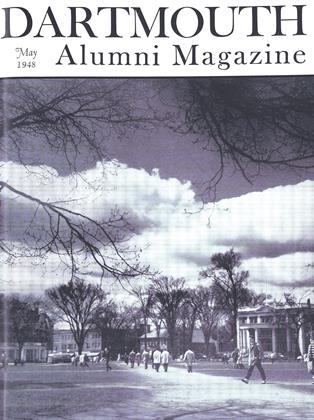IN MARCH while wrestling with an oldfashioned case of grippe I read TheHooded Hawk, a study of James Boswell by D. B. Wyndham Lewis. Lewis writes at times with a chip on his shoulder, but with acumen and good sense; the result is a singularly diverting biography of a man long deserving a better fame. It is true that Boswell was a drunkard, a lecher and slightly mad, but he was also warmhearted, a man capable of winning and keeping the devotion of such a High Churchman and Tory as Samuel Johnson, and a writer of gusto to boot. He is the writer of a magnificent travel book as well as of the finest biography in the language. This because he was, of Johnson's contemporaries, unequalled at reproducing the rhythms of his sonorous and impressive speech.
Mr. Lewis clears up a lot of nonsense about Boswell. We are with him when he tells Rousseau about his near-conversion to Catholicism, we see him failing to impress the Sage of Ferney, and winning for a friend the great Corsican patriot Paoli. We take walks with him and John Wilkes to gaming tables, bagnios, and to Tyburn where executions seem to hold a particular fascination for him. It was the incomparable Wilkes who annihilated 'Jemmy Twitcher' Sandwich with one of the most brilliant retorts in history: "I am convinced, Mr. Wilkes, that YOU will die either of a pox or on the gallows." "That, my lord, depends on whether I embrace your mistress or your principles."
We read a remark made by a forgotten lawyer concerning philosophy to the effect that he had tried for years to be a philosopher but that cheerfulness would come breaking in! We also learn that Daines Barrington, one of Gilbert White's correspondents in his famous nature book, TheNatural History of Selborne, "in old age tried to bribe the Temple gardener to poison all the Temple sparrows." Lewis adds, in an understatement, "a peculiar development for White's friend."
From this I turned to re-read the authentic version of Boswell's Journal of aTour to the Hebrides, published here for the first time as late as 1936. It is a most entertaining book and once again the reader revels in the fantastic good sense of the great and good Dr. Johnson. Almost worth being ill to rediscover this.
Percy Lubbock's Portrait of Edith Wharton is not, I feel sure, exactly what he wished it to be. He reveals her as a cold, selfish creature who sacrificed everything in life to good form and to her own desires. Her attitude concerning children and her Pomeranian characterize her. She feared and disliked the former, and adored the latter. Loneliness she knew only in her old age when her little Linky died—a dog, she tells us, who understood her thoughts: "We really communicated with each other —and no one had such wise things to say as Linky." Utter and absolute nonsense. As a writer she has already slipped into the third or fourth bracket. Not at all a very pleasing personality.
Edward Anthony, publisher of the Woman's Home Companion, is a rhymster of distinction, and has, with Morgan Dennis, the etcher, recently produced the almost perfect dog book, Every Dog Has HisSay. Watson-Guptill is the publisher.
Readers interested in Arabia will find illuminating a somewhat arid autobiography by H. St. John Philby, called ArabianDays. He is the best informed Westerner on Arabia, and especially on the United States outpost Saudi Arabia, and its magnificent 68-year-old king, Ibn Saud. When Gertrude Bell, Hogarth, Lawrence and the British F. O. were wrong, Philby was right. He has an uncanny knack for always being right concerning matters Arabian. He mentions the fact that Lawrence's knowledge of Arabian dialects was, in fact, not very good, though he does not detract from his greatness. He is frank about his disappointment when his pupil Bertram Thomas beat him to the first crossing of the Rub'al Khali. Few will conjecture correctly what influence Saud's kingdom is at this moment having on our foreign policy, on the question of Palestine partition, and on our relationships with Russia, but with a yield which may reach one hundred billion barrels of oil it is certainly having considerable. The reader will learn much about King Ibn Saud, and his kingdom if he reads Philby's book. Available so far only in the English edition published by Robert Hale.
I wish to reiterate my advice to buy the Collected Tales of A. E. Coppard (Knopf). To the three best stories mentioned in The New Yorker, "Judith," "The Higler," and "The Man from Kilsheelan," I would add the story of the disrobing ghost, "Ahoy, Sailor Boy!" In a time undistinguished by good fiction this book stands out like a beacon.
 View Full Issue
View Full Issue
More From This Issue
-
 Article
ArticleTHE MEANING OF TOLERANCE
May 1948 By W. K. JORDAN -
 Class Notes
Class Notes1918
May 1948 By ERNEST H. EARLEY, DONALD L. BARR, DAVID L. GARRATT -
 Article
ArticleDartmouth Today is His Tribute
May 1948 By WILLIAM H. HAM -
 Class Notes
Class Notes1919
May 1948 By J. K. HUNTINGTON, MAX A. NORTON, ROSCOE A. HAYES -
 Class Notes
Class Notes1942
May 1948 By JAMES L. FARLEY, JOHN H. HARRIMAN, ADDISON L. WINSHIP II -
 Article
Article"Pest House" Days
May 1948 By ALICE POLLARD
HERBERT F. WEST '22
-
 Article
ArticleHanover Browsing
February 1938 By HERBERT F. WEST '22 -
 Article
ArticleHanover Browsing
December 1938 By HERBERT F. WEST '22 -
 Article
ArticleHanover Browsing
November 1942 By HERBERT F. WEST '22 -
 Article
ArticleHanover Browsing
February 1943 By HERBERT F. WEST '22 -
 Books
BooksTHE AMAZING JOURNEY OF DAVID INGRAM
December 1949 By Herbert F. West '22 -
 Books
BooksCURRENT PROSE: A COLLEGE READER
July 1953 By HERBERT F. WEST '22








